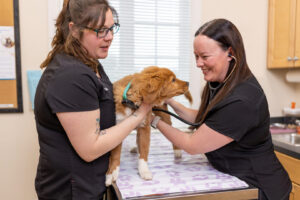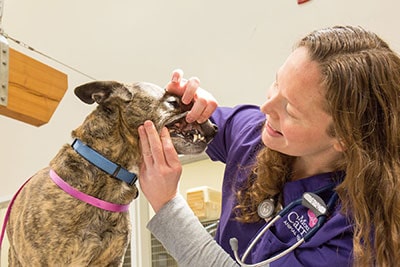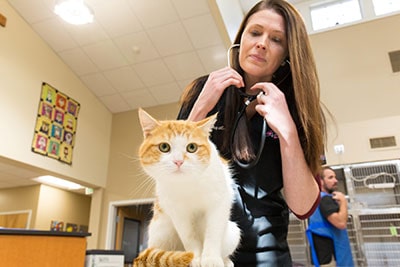Wellness Care for Dogs & Cats in Northern Baltimore County
MCAH believes that preventive care is the key to healthier pets. Regular checkups with a veterinarian can extend a pet’s length and quality of life. Early detection of illnesses often enables our veterinary team to provide more treatment options, keep treatment costs manageable, and can lead to more positive outcomes. Regular wellness exams and diagnostics provide the MCAH team with the most accurate picture of a pet’s health.
Wellness Care Standards for Dogs

Dr. Mara Howard
Wellness Exams
- Puppies should be seen every 3-4 weeks until 16 weeks of age, then again at 14-16 months of age.
- Adult dogs should be seen for wellness exams annually.
- Senior dogs (ages 8 years and older) should be seen for wellness exams one to two times per year, based on their individual health conditions. Very large breeds such as Great Danes, Irish Wolfhounds, etc. are considered senior pets at an earlier age.
Wellness Diagnostic Profiles – may include urinalysis and blood tests
- For healthy dogs, we recommend annual wellness diagnostic screening. We offer Wellness Bloodwork Packages for dogs that include:
- Blood Chemistry Panel: Evaluates organ function (liver, kidneys, pancreas), electrolytes, and glucose levels.
- Complete Blood Count (CBC): Assesses red and white blood cells, platelets, and overall blood health.
- Fecal Screening: Identifies parasitic worms and protozoa. We use PCR testing which utilizes antigen testing to detect intestinal parasite infections earlier and more accurately than traditional fecal ova and parasite testing. Screens for: roundworms, hookworms, whipworms, and flea tapeworms, and parasitic protozoa (Giardia, coccidia, Cystoisospora, Cryptosporidium, and more).
- 4DX PLUS: The IDEXX 4DX Plus screen tests for heartworm infection and other tick-borne diseases such as Lyme disease, Ehrlichia, and Anaplasma
- Urinalysis: Detects infections, kidney disease, diabetes, and urinary tract problems.
Screening for Heartworm & Tick-Borne Diseases
- Beginning at 16 months of age if the dog has been on preventative since puppy days.
- Every year for pets on preventative year round (recommended in our region).
- For pets not on heartworm preventative year round, screening must be performed before restarting preventative and six months after restarting. Year-round protection is highly recommended in our region.
- Annual screening is required for manufacturer Satisfaction Guarantees on parasite preventatives.
Fecal Screening for Parasites
- Every year to check for intestinal parasites. Dogs may not show symptoms of intestinal parasites but left untreated, they may cause intestinal inflammation, failure to grow and thrive, or weight loss.
- Retest four weeks after being treated for intestinal parasites following a positive fecal screening.

Dental Health
- Begin tooth brushing at home as early as possible to develop good habits – even those puppy teeth! Continue regular tooth brushing at home through the senior years.
- Annual assessment of dental health is part of our wellness exam.
- Dental cleanings and X-rays as recommended by the veterinarian. Brushing at home can extend the time between dental cleanings at the hospital.
Flea & Tick
- We recommend year-round preventatives for all dogs.
- Bravecto is an oral chewable that provides 12 weeks of protection. We recommend starting dogs on Bravecto at 6 months of age.
- Puppies: For puppies under 6 months of age, we recommend Bravecto 1-month, an oral chewable that provides one month of protection.
Heartworm & Intestinal Parasites
- We recommend year-round protection against internal parasites for all dogs.
- Sentinel Spectrum is an oral chewable that provides one month of protection against heartworms, hookworms, roundworms, whipworms, and tapeworms.
- We recommend starting puppies on Sentinel Spectrum at 8 weeks of age. If not started by 5-6 months old, puppies must have a screening test.
- All dogs must be tested before starting or restarting heartworm preventative. For missed doses (more than 7 weeks between doses), dogs should be retested 6 months after the last dose.
Rabies – Required by Maryland and Pennsylvania law for all dogs
- Puppies should vaccinated between 14-20 weeks of age, with a booster vaccine administered at 1 year.
- Re-vaccinate every three years.
- Booster vaccine within 7 days if your pet gets into a scuffle with wildlife or other pets with unknown vaccine status.
DHPP/DHLPP (Distemper, Hepatitis [Adenovirus], Parvo, Parainfluenza/Leptospirosis)
- Begin at 6-8 weeks of age and booster vaccine every 3-4 weeks until 14-16 weeks of age.
- Re-vaccinate at 1 year, 2 years and every 3 years thereafter.
- If DHLPP is given, Leptospirosis must be re-vaccinated annually.
Leptospirosis
- Vaccinate at 12 weeks, booster at 16 weeks.
- Re-vaccinate every year. May be given as the DHLPP combo.
Non-Core Vaccines – Recommended based on life style, activity, location, individual health condition
Bordetella (Kennel Cough)
- Recommended for dogs that will be in contact with other dogs at a grooming or boarding facility, dog park, training classes, shows, etc. Often required by boarding facilities.
- Vaccinate at 8 weeks (oral), and then annually thereafter.
Lyme Disease
- Due to the prevalence of ticks and Lyme disease in our area, we recommend for all dogs.
- Vaccinate at 12-14 weeks, booster in 3-4 weeks, then annually thereafter.
Canine Influenza
- Very low risk in our region. If a local outbreak occurred we would recommend for all dogs that may be in contact with other dogs.
- Vaccinate at 12-14 weeks, booster in 2-4 weeks and then annually thereafter.
Wellness Care Standards for Cats

Wellness Exams
- Kittens should be seen every 3-4 weeks until 16 weeks of age, then again at 14-16 months of age.
- Adult cats should be seen for wellness exams annually.
- Senior cats are those 10 years and older. They should be seen for wellness exams one to two times per year, based on their individual health conditions.
Wellness Diagnostic Profiles – may include urinalysis and blood tests
- For kittens and adult cats with unknown health history, we recommend screening for Feline Leukemia (FeLV) and Feline AIDS (FIV). Both of these conditions are contagious and any new cats should be screened before being introduced to a home with other cats.
- For healthy cats, we recommend annual wellness diagnostic screening. We offer Wellness Bloodwork Packages for cats that include:
- Blood Chemistry Panel: Evaluates organ function (liver, kidneys, pancreas), electrolytes, and glucose levels.
- Complete Blood Count (CBC): Assesses red and white blood cells, platelets, and overall blood health.
- Fecal Screening: Identifies parasitic worms and protozoa. We use PCR testing which utilizes antigen testing to detect intestinal parasite infections earlier and more accurately than traditional fecal ova and parasite testing. Screens for: roundworms, hookworms, whipworms, and flea tapeworms, and parasitic protozoa (Giardia, coccidia, Cystoisospora, Cryptosporidium, and more).
- Cardiopet ProBNP: Measures the concentration of NT-proBNP, a protein released by the heart in response to stress and stretch, to assess canine and feline heart health.
- For senior cats
- Urinalysis: Detects infections, kidney disease, diabetes, and urinary tract problems.
- Total T4: Measures the thyroxine (T4) hormone levels in a pet's blood, helping veterinarians diagnose and monitor thyroid disorders
Fecal Screening for Parasites
- Every year to check for intestinal parasites. Dogs may not show symptoms of intestinal parasites but left untreated, they may cause intestinal inflammation, failure to grow and thrive, or weight loss.
- Retest four weeks after being treated for intestinal parasites following a positive fecal screening.
- Annual screening and deworming are very important for cats that spend any time outdoors and may come in contact with wildlife.
Dental Health
- Begin tooth brushing at home as early as possible to develop good habits – even those kitten teeth! Continue regular tooth brushing at home through the senior years.
- Annual assessment of dental health is part of our annual wellness exam.
- Dental cleanings and X-rays as recommended by the veterinarian. Brushing at home can extend the time between dental cleanings at the hospital.
Flea, Tick & Intestinal Parasites
- We recommend year-round preventatives for indoor and outdoor cats.
- NexGard Combo is a monthly, topical treatment that protects against fleas, ticks, heartworms, roundworms, hookworms, and tapeworms. It is our first choice for parasite control. We recommend starting kittens on NexGard Combo at 8 weeks of age.
Rabies – Required by Maryland and Pennsylvania law for all cats
- Kittens should be vaccinated at 16 weeks old, with a booster vaccine administered at 1 year of age.
- Re-vaccinate every three years.
- if your pet gets into a scuffle with wildlife or other pets with unknown vaccine status, we recommend a rabies booster vaccine within 7 days.
FVRCP (Feline Rhinotracheitis Virus, Calicivirus, Panleukopenia)
- Begin at 6-8 weeks of age and booster the vaccine every 3-4 weeks until 14-16 weeks of age.
- Re-vaccinate at 1 year old and every 3 years thereafter.
ABOUT VACCINES
Whether at doggie daycare, at the groomer, or out in your own backyard, there is the possibility of our pets coming into contact with a contagious disease. Keeping up to date on the appropriate vaccinations helps protect pets and helps ensure they are with us for many years to come. We will tailor our recommendations to your pet and your lifestyle.
We want to be sure that your pet is protected from disease and recommend core vaccines for all dogs and cats. However, if your pet has a history of adverse reactions to vaccines, we can perform vaccine titers. Titers are blood tests that tell us whether your pet has sufficient antibodies to protect against distemper, adenovirus, and parvovirus. Regular titer testing is more expensive than regular vaccinations, but for pets that have reactions may decrease the number vaccinations they receive.
